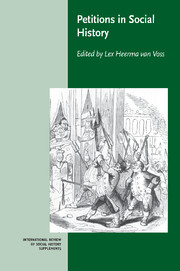Book contents
- Frontmatter
- Contents
- NOTES ON CONTRIBUTORS
- Introduction
- Voices from Among the “Silent Masses”: Humble Petitions and Social Conflicts in Early Modern Central Europe
- Supplications between Politics and Justice: The Northern and Central Italian States in the Early Modern Age
- The Power of Petitions: Women and the New Hampshire Provincial Government, 1695–1700
- Officially Solicited Petitions: The Cahiers de Doléances as a Historical Source
- Revolt, Testimony, Petition: Artisanal Protests in Colonial Andhra
- Deference and Defiance: The Changing Nature of Petitioning in British Naval Dockyards
- Petitions and the Social Context of Political Mobilization in the Revolution of 1848/49: A Microhistorical Actor-Centered Network Analysis
- The Image of Jews in Byelorussia: Petitions as a Source for Popular Consciousness in the Early Twentieth Century
- “Begging the Sages of the Party-State”: Citizenship and Government in Transition in Nationalist China, 1927–1937
- Private Matters: Family and Race and the Post-World-War-II Translation of “American”
Revolt, Testimony, Petition: Artisanal Protests in Colonial Andhra
Published online by Cambridge University Press: 04 August 2010
- Frontmatter
- Contents
- NOTES ON CONTRIBUTORS
- Introduction
- Voices from Among the “Silent Masses”: Humble Petitions and Social Conflicts in Early Modern Central Europe
- Supplications between Politics and Justice: The Northern and Central Italian States in the Early Modern Age
- The Power of Petitions: Women and the New Hampshire Provincial Government, 1695–1700
- Officially Solicited Petitions: The Cahiers de Doléances as a Historical Source
- Revolt, Testimony, Petition: Artisanal Protests in Colonial Andhra
- Deference and Defiance: The Changing Nature of Petitioning in British Naval Dockyards
- Petitions and the Social Context of Political Mobilization in the Revolution of 1848/49: A Microhistorical Actor-Centered Network Analysis
- The Image of Jews in Byelorussia: Petitions as a Source for Popular Consciousness in the Early Twentieth Century
- “Begging the Sages of the Party-State”: Citizenship and Government in Transition in Nationalist China, 1927–1937
- Private Matters: Family and Race and the Post-World-War-II Translation of “American”
Summary
This paper examines the form, content, and role of petitions in the context of protests occasioned by the handloom weavers of colonial Andhra, particularly the northern districts of the northern Coromandel region, between 1770 and 1820. Minor and major protests and revolts by weavers erupted with increasing frequency from around the middle of the eighteenth century, whenever their socioeconomic structures and conditions of work and trade were under threat from the old and new elites, as well as from the commercial interests of the colonial state. On these occasions, weavers expressed their grievances through petitions and representations, either in combination with other strategies or independently. These petitions therefore offer opportunities to study and identify the economic and social conditions that prompted weavers to resort to collective action. Careful analyses of the petitions yield considerable insights with respect to the causes of the protests; their spatial and social diffusion; the social profile of contending parties, and their mentalities; the changing organizational structure of the textile industry; the petitions' consequences; and, finally, the attitude of the colonial state towards these petitions.
The existing literature on law and society in colonial India discusses extensively the impact of colonialism on agrarian relations and social reform issues. However, with a few exceptions, the implications of law and the impact of new legal provisions on the nonagrarian economy remains unexplored. Here, therefore, the emphasis is on those factors that compelled the weavers to accept the “petition” as the ventilator of grievances by the beginning of the nineteenth century.
- Type
- Chapter
- Information
- Petitions in Social History , pp. 107 - 130Publisher: Cambridge University PressPrint publication year: 2002
- 5
- Cited by



